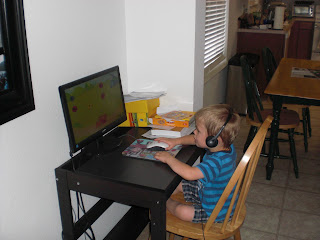I attended a multi-day conference on executive function and how it relates to school success. Of course the first place to start should be to define executive function. Here's the problem, no one agrees. There are more than 30 credible definitions and 100s of less than credible definitions. So, here are the most common items included by various definitions:
Inhibition (self-control)
Working Memory (spatial and verbal)
Cognitive Flexibility
If you ask any teacher, these are the types of skills that are the most important in the classroom. It's much easier to teach a child to read than to teach a child self-control. Every Kindergarten teacher would rather have a class full of kids who have self-control, a good working memory, and cognitive flexibility than having a classroom full of kids who can read and do math above grade level. When you are pushing your child to be more academic stop and think about the things that are more important.
Let's look at each of these one at a time. Inhibition is more than just not hitting the jerk next to you (though that is certainly part of it). It's also controlling when you talk and what you say (I'm still working on that one). You also need to be able to inhibit the tendency to be distracted, to quit if bored or offered temptation, etc. I remember a band director once telling us the most difficult parts of any piece of music are the rests. That's the inhibition part of executive function.
Working memory is actually one of the best predictors of academic success. How much you can hold in your working memory and how you are able to manipulate it is pretty much how we define school success. This relates to reading graphs, reading books, following directions, having a discussion, and being able to consider things from multiple perspectives. Without working memory you can't make connections to other things, which is how we build neural connections in the brain. This is how we build all knowledge.
Cognitive flexibility is the most difficult part of executive function. This is being able to make mental, physical, and behavioral transitions. This is knowing the rules are different at school than at home. Pretty much every place we go, the rules are at least slightly different. Even within one place the rules can be different - at home with a babysitter versus a parent - at school in music class versus on the playground. We all know kids, and some adults, who struggle with these types of transitions. Cognitive flexibility also helps with being able to understand multiple perspectives. This is what allows us to have "outside the box" thinking and is crucial for problem solving.
Think of executive function as the director of an orchestra. Your brain does many different things, but the executive function tells it what to do and when. Many disorders start with executive
dysfunction - ADHD, Tourett's Syndrome, Obsessive-Compulsive Disorder, Depression, Autism, Learning Disabilities, Anxiety, etc. Ideally, we would test for executive function so we could help improve in all of these areas. Only, how do you test for something you can't define? This is the problem we are currently trying to address. There are some executive function evaluations on the market, however they don't cover most of what we actually want to know. I heard one analogy that it would be like giving an eye test and a coordination test and using that to determine who can drive. Those things are both needed, but there is so much more to driving, just as there is much more to executive function than the current tests evaluate.
Follow my blog with Bloglovin































![DIGITAL FIELD TRIPS AND SCIENCE SOFTWARE [Image: DIGITAL FIELD TRIPS AND SCIENCE SOFTWARE]](https://www.educents.com/img/medium_big_thumb/Deal/1212.bba544a150c73cbfdb8de4b6ded13495.jpg)









